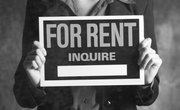If you are a property owner, you can rent your home as a Section 8 property. By renting to a Section 8 household, you receive a guarantee from the federal government. The Department of Housing and Urban Development (HUD) pays you each month the portion of the tenant's rent that exceeds 30 to 40 percent of their income. HUD requires local public housing agencies (PHAs) across the nation, including those in New Jersey, to follow virtually the same protocol for accepting properties into the Section 8 housing program.
Set your rent at or around the fair market price for your area. HUD sets fair market rents every year. In the Atlantic City-Hammonton, New Jersey, metropolitan area, for example, the 2011 fair market rent for a two-bedroom is $1,100. In the Middlesex-Somerset-Hunterdon metro area, it is $1,449. While a Section 8 family can rent a unit that exceeds an area's fair market rent, they must pay the amount over HUD's payment standard. The family's total share of the rent, however, cannot exceed 40 percent of their income. Price your rental with that in mind or be prepared to adjust if necessary.
List your home using traditional sources of advertisement such as newspapers and websites. You can also include your vacancy on the Go Section 8 website, which deals exclusively in Section 8 listings. The New Jersey Housing Resource Center website also accepts listings for subsidized rental opportunities.
Find a tenant you are interested in renting to. You are not obligated to rent to Section 8 families. If you do find a Section 8 tenant, screen them. As the Newark Housing Authority explains, after the tenant passes your screening and application process, he will ask you to complete a Request for Tenancy Approval (RTA) Packet.
Include the required documents with your RTA packet. According to the Newark Housing Authority, these items include a copy of the unsigned lease agreement, recent utility bills and a current mortgage statement. The prospective tenant will forward the packet to the New Jersey PHA that covers your area.
Schedule an inspection of your property. Your PHA will contact you to set this up. They need to ensure that your home meets HUD's Housing Quality Standards (HQS). While the HQS are lengthy (See Resources), you generally need to provide a safe and sanitary environment for your renters that includes a fire exit, adequate facilities for waste disposal and food preparation and safe and working plumbing, heating and electrical systems.
Sign a one-year lease when your PHA approves your unit. You also enter a Housing Assistance Payment contract with your PHA. This pact details the responsibilities of all parties--tenant, landlord and PHA--in a Section 8 tenancy.
References
Writer Bio
As a writer since 2002, Rocco Pendola has published numerous academic and popular articles in addition to working as a freelance grant writer and researcher. His work has appeared on SFGate and Planetizen and in the journals "Environment & Behavior" and "Health and Place." Pendola has a Bachelor of Arts in urban studies from San Francisco State University.

